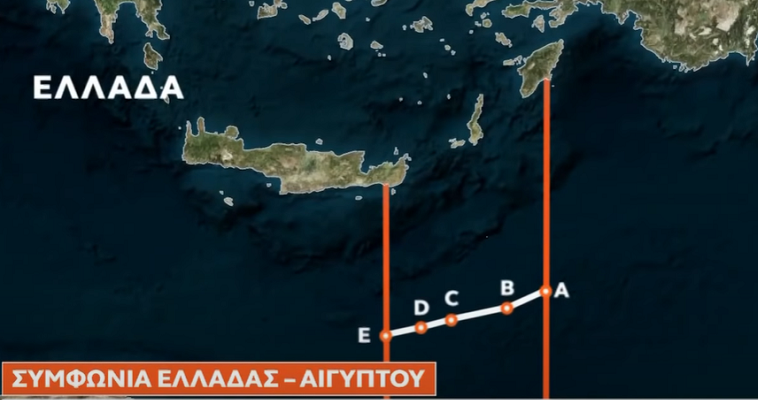Thodoros Stathis: Cairo Agreement: Perfect is the enemy of good
11/08/2020
The partial demarcation of the EEZ with Egypt has provoked some reactions, even in the political arena where the partial application of international law was “just and became reality”. This is observed because different experts analyze the same data differently, while for political parties this happens over time for reasons of maintaining their electoral clientele.
What are the data-hypotheses? Firstly, there is international law which sets out the rights and procedures for delimiting the EEZ between neighboring countries. Even if they disagree, the law of the sea provides for the International Court of Justice to find a solution. For some, however, court decisions are not accepted either.
Secondly, this international law has not been accepted by all countries, despite the fact that some apply it without exceptions and some apply it when they try it, by force of arms. But the law of the sea applies to everyone, whether they accept it or not.
Thirdly, international law exists, but in its application this rule applies: everyone is out for themselves! In practice, this means “big fish eats the small fish”. It is a law, the application of which is more like going the way the wind blows!
Conclusion: using this data pundits try to make their analyses and draw their conclusions in a global regime of chaos. In a state of chaos, forecasts, even for the very near future, do not allow for safe conclusions because we do not know the data, especially in the Trump era. We Greeks, and of course the Cypriots, should be more down to earth with the abundance of examples we have had. The Turkish invading forces of 1974 are still on the island, despite the decisions of the Security Council and the UN General Assembly. We may have justice on our side, but where can we find it?
Partial demarcation is divisive
I heard in the news from an expert that the partial demarcation of the EEZ is very important, but it should have been done twenty days later, so as not to give Erdogan an excuse to withdraw from his planned negotiations with Greece. Erdogan’s reaction – in my view, like that of many others – to the partial delimitation of the EEZ with Egypt is due to the fact that it was based on the provisions of international law, somewhat influenced by previous decisions of the International Court of Justice and certainly by the priorities of Greek diplomacy.
If Erdogan had in mind to negotiate under international law, he would have applauded the partial demarcation of the EEZ between Greece and Egypt. So he had another agenda in mind, which we have known and seen over and over for so many years, but we have not yet assimilated. With this agenda in mind, Erdogan would start the negotiations so that we would have to interrupt them and then we would have to apologize and when one apologizes there is a problem.
Another case that is circulating is related to the question why there was a partial and not a total delimitation of the EEZ. In fact, Professor Theodoros Karyotis, who from the beginning experienced and worked hard for the creation of the international law of the sea, informs us that there is no partial delimitation of the EEZ. First, the two sides did not declare that they were suspending negotiations on the demarcation of the rest of the EEZ.
Greece, bearing in mind the appetites of Turkey, was in haste to announce, at least, the partial demarcation to prove to the rest of the world that solutions exist when international law is respected. I do not think there has been any country that has expressed dissatisfaction because the two countries have so far, under international law, agreed on this point. The 44% -56% agreement is a result of the current situation. Egypt took advantage of circumstances and got something more. The same happened with Italy.
The Turkish-Libyan memorandum factor
The situation for Greece is not favorable, if we also take into account the evolution of the Turkish-Libyan memorandum. This has come at a cost, which some consider a necessary evil, because it serves a purpose at this time. The strategy is not based on constants, it is based on objectives on which maximum and minimum outcomes are predicted, depending on the situation and the bargaining power one has. Others, however, consider the cost excessive.
Is this obsession in negotiation, aiming at the best outcome many more years ahead (how many no one knows, not even if this time will be available) during the current situation that requires, in terms of Greece solutions here and now, not the appropriate way? A substantiated proposal for the choice of this road has not come to my notice. Some talk about risks. In matters relating to national security risks, which in this case arise on the basis of a logic of bluffing, are prohibitive.
Only those who are strong make bluffs, not those who appear strong. Or doing something similar in Libya with what Turkey is doing, while asking for severe sanctions from the EU against Turkey! Surely everyone in Greece would prefer a 50% -50% result, and, also, not a partial demarcation. However, based on what has been circulating, Egypt does not want to be part of the Greek-Turkish problem. This was the main reason why there was no agreement for so many years.
We said above: everyone is out for themselves! This is the basis of international relations and what amazes me is that some who disagree keep telling us that we are “alone”. In relation to the partial demarcation agreement, there is also the contention of some who disagree with the agreement, that the rest of Rhodes, Kastellorizo, the islands of Strongyli, Ro and 11 other islands and islets (uninhabited islands and islets are not entitled to an EEZ) will lose their EEZs .
War is not the solution
Very strange conclusion. That is, the EEZ is recognized for half of Rhodes which is the status quo ante for the future course of the expansion of the EEZ in the rest of the archipelago on the same basis, but for them this development is a lost cause. If this development is a lost cause, then how do they consider claiming everything here and now as a possible alternative?
Unless they consider war with Turkey inevitable and that in such a case Greece will win despite being all alone. It is also strange to characterize the policy of Greece, which has pursued throughout the post-junta period a policy of deterrence of the Turkish threat and a policy of good neighborliness, as phobic. Greece does not solve problems with wars.
Greece will only fight if it is drawn into war. As long as the policy of deterrence is based on good foundations, then war will be avoided. The more so a potential enemy will take into account the cost for him in the event of a war. Unfortunately, there was a period of relaxation of our deterrent policy during which elements of the core of this policy were replaced by plans for the Europeanization of Turkey!
The limiting factors
During my tenure as Deputy Minister of National Defense, the necessary evil of high defense spending began to balance out with the parallel development of our defense industry. The basis was the offsets, which the vendors themselves had to complete through specific production contracts with Greek companies in Greece, before we signed the agreement for the purchase of weapons systems.
It was the period when Greek companies began to be established to transfer modern technology to Greece. ELVO, which at that time (1986) was on the verge of bankruptcy, was saved with the Leonidas 2 program (armored personnel carrier), with a budget of 22 billion drachmas, in 1990 it went into profit with 500 million drachmas, according to the announcement of the then prime minister Konstantinos Mitsotakis in Parliament (see “The National Defense and its Achilles Heel”, Livanis publications).
Finally, there is another limiting factor when it comes to hydrocarbon reserves, and that is the time it takes to deplete energy sources (which end up being unwanted because technologies are evolving rapidly). But one would say that in the EEZ we have the fish and the air above the sea and our backing down deprive us of everything. I will quote the saying: Perfect is the enemy of good, especially in our region.





